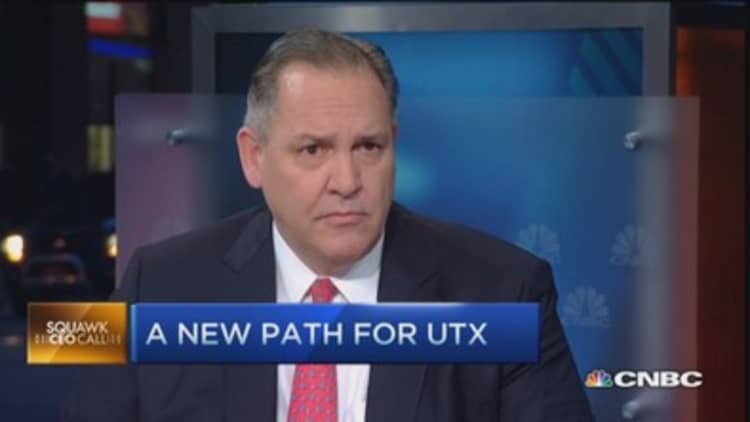
United Technology's decision to possibly spin off its Sikorsky helicopter business was difficult, but ultimately would create value by giving shareholders the choice between owning a helicopter business or an aerospace and commercial buildings firm, CEO Gregory Hayes said Thursday.
"The issue with Sikorsky here is not that Sikorsky is a bad business. Sikorsky is a great helicopter business," he said. "As we think about the portfolio, though, it's really a question of, 'How do you position yourself for above GDP growth, for higher margin into the future?'" he said in a CNBC "Squawk Box" interview.
Read MoreUTC plans spin-off for Black Hawk unit
On Tuesday, UTC announced that its board of directors had authorized a review of strategic alternatives for its Sikorsky unit. One possible outcome is a tax-free spinoff.
Hayes said that while Sikorsky is a "great business" with $16 billion in backlogs, its growth will be governed by defense spending and area of "huge uncertainty." While the Sikorsky unit's $7 billion in revenue has a roughly 10 percent profit margin, the rest of the business boasts margins of 16 percent and is growing 5 to 6 percent.
In addition to building Black Hawk helicopters, the diversified manufacturer makes jet engines under the Pratt & Whitney name and Otis-brand elevators.
Hayes replaced Louis R. Chenevert as CEO in November. He said the Sikorsky announcement is the first step in a review of each piece of United Technologies' portfolio.
"I think what we have left is a $60 billion business that is poised for high growth and high earnings growth for the next decade," he said.
Read MoreISIS and Russia threaten, and NATO cuts spending
United Technology has also been betting on commercial aerospace. In 2012, it purchased aerospace manufacturer Goodrich and bought out Rolls-Royce's shares in International Aero Engines.
The company has strict guidelines for future acquisitions in commercial aerospace and buildings, said Hayes, adding that UTC will likely wait to make purchases because valuations are currently "sky high."
However, he noted that "Europe is on sale today." With the euro falling to near parity with the dollar, properties that once seemed out of reach may now appear actionable, he added.
But the strengthening dollar has also created headwinds for United Technologies, prompting the firm to lower full-year guidance for 2015 when it reported quarterly earnings in January. A stronger dollar makes U.S. goods more expensive on foreign markets and dilutes earnings when American companies bring profits back home.


